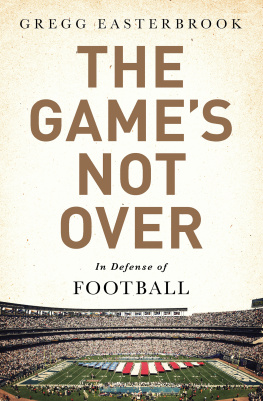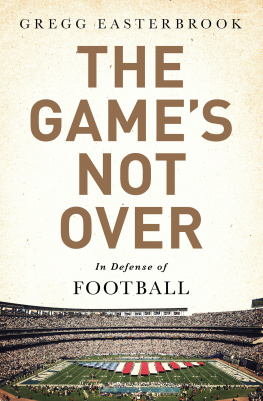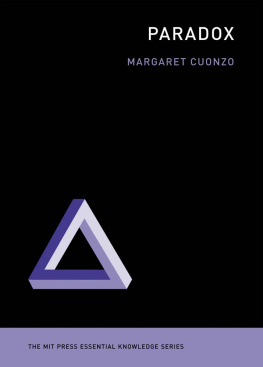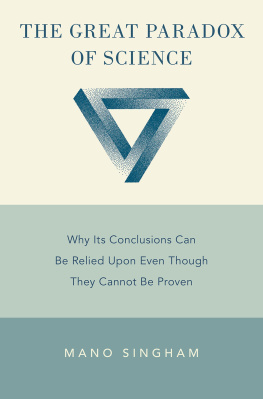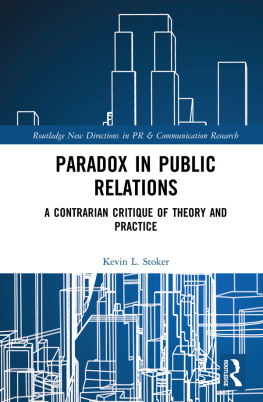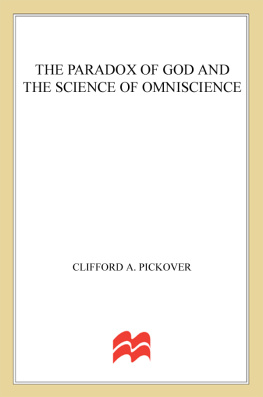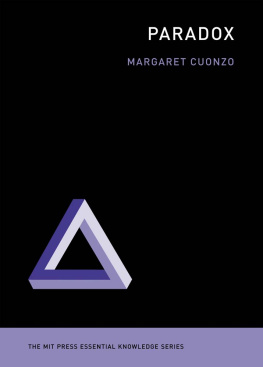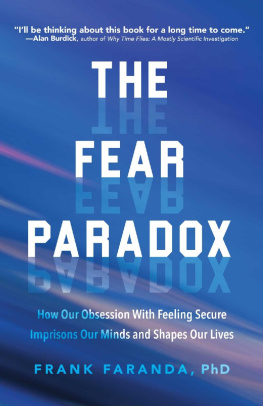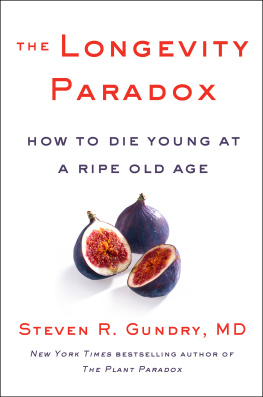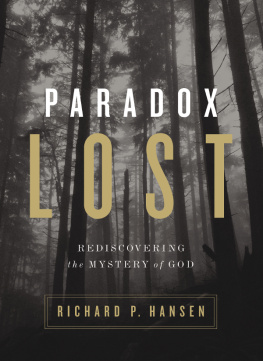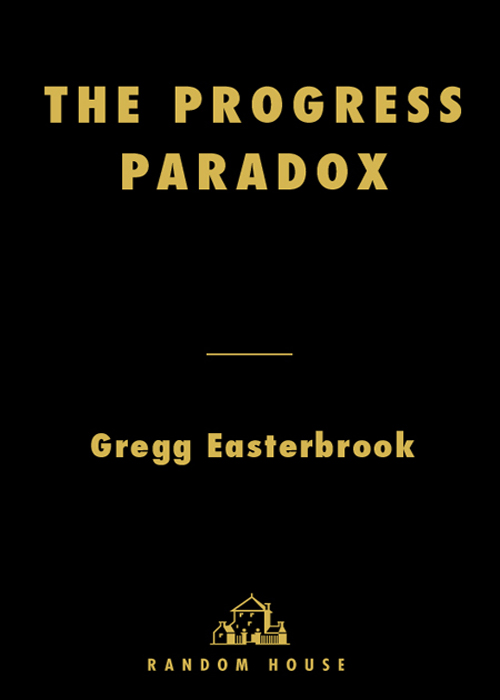
THE
PROGRESS
PARADOX
How Life Gets Better
While People Feel Worse
GREGG EASTERBROOK

RANDOM HOUSE / NEW YORK
CONTENTS
For my mother,
VIMY HOOVER EASTERBROOK
19171976
Happiness makes up in height
what it lacks in length.
ROBERT FROST
Introduction
IF THEY COULD SEE US NOW
Suppose your great-great-grandparents, who lived four generations ago, materialized in the United States of the present day.
Surely they would first be struck by the scale and clamor of present-day life, and might not like these things; neither do we, necessarily. The physical speed of contemporary life would also shock our forebears, who considered New York to London in a week to be a blazing-fast transit, and none of whom ever experienced the velocity now common to everyone on highways. When newfangled Great Western Railway steam engines left London in 1844 to pull coaches at forty-five miles per hour, commentators expressed horror at such unnatural swiftness, while physicians urged passengers to avoid the trains on grounds that anyone moving so rapidly would surely suffocate. Now much greater speeds go unnoticed in daily events; we live, work, and try to relax surrounded by steel objects whizzing past, many of them guided by teenagers. The psychological speeds we must sustain, and the attendant anxieties, are in their own ways as hazardous. Add in nuclear bombs, global terrorism, and the inescapable inanity of mass entertainment, and your great-great-grandparents initial reaction to the present day might be to recoil in dismay and demand to return to their own time.
Yet as your ancestors four generations removed learned more of contemporary life, they would be dazzled. Unlimited food at affordable prices, never the slightest worry about shortage, unlimited varietystrawberries in March!so much to eat that in the Western nations, overindulgence now plagues not just the well-off but the poor, the poor being more prone to obesity than the population as a whole. Four generations ago, the poor were lean as fence posts, their arms bony and faces gaunt. To our recent ancestors, the idea that today even the poor eat too much might be harder to fathom than a jetliner rising from the runway.
Many other aspects of contemporary life, taken for granted by those of us who live it, would dazzle our recent ancestors. At the beginning of the twentieth century, the average American lifespan was forty-one years; now it is seventy-seven years, equating to almost twice as much time on Earth for the typical person. Historys plaguespolio, smallpox, measles, ricketshave been defeated, along with a stunning reduction of the infectious diseases that for pre-antibiotics generations instilled terror. Every one of our great-great-grandparents would have known someone who died of a disease that today is shrugged at; many of our recent ancestors themselves departed this life as victims of diseases at which we now shrug. My paternal grandfather died in 1921 of lockjawthen untreatable, today cured by a few vials of inexpensive chemicals.
Many other aspects of present-day life would strike our recent ancestors as nearly miraculous. The end of backbreaking physical toil for most wage earners. The arrival of leisure, the typical person now engaged in exertion (either for pay or within the household) about half as many hours as in the nineteenth century. The advent of instantaneous global communication and same-day travel to distant cities. The end of formal discrimination against minorities and women, increasing opportunity while allowing those who succeed to feel their achievements are fairly won. Mass home ownership, with heated dwellings everywhere, cooled homes almost everywhere. The entire senior-citizen demographic cared for financially and medically, ending the fear of impoverished old age. Complete, and usually low-cost, access to information, art, and literature. Incredible advances in freedom: political freedom, freedom of expression, sexual freedom, freedom from conscription.
Today we live a long time, in fairly comfortable circumstances; enjoy goods and services in almost unlimited supply; travel where we wish quickly and relatively cheaply; talk to anyone in the world; know everything there is to know; think and say what we please; marry for love, and have sex with whomever will agree; and wail in sorrow when anyone dies young, for this once-routine event has become a wrenching rarity. All told, except for the clamor and speed of society, and for trends in popular music, your great-great-grandparents might say the contemporary United States is the realization of utopia.
Yet how many of us feel positive about our moment, or even believe that life is getting better? Today Americans tell pollsters that the country is going downhill; that their parents had it better; that they feel unbearably stressed out; that their children face a declining futureand Americans were telling pollsters this even during the unprecedented boom that preceded the tragedy of September 11, 2001.
The percentage of Americans who describe themselves as happy has not budged since the 1950s, though the typical persons real income more than doubled through that period. Happiness has not increased in Japan or Western Europe in the past half-century, either, though daily life in both those places has grown fantastically better, incorporating all the advances noted above plus the end of dictatorships and recovery from general war. On the first day of the twenty-first century, President Bill Clinton declared that Western society had never before enjoyed, at once, so much prosperity combined with so much social progress. This statement was not just politics; objectively, it is true. Nevertheless the citizens of the United States and the European Union, almost all of whom live better than almost all of the men and women of history, entertain considerable discontent.
Far from feeling better about their lives, many are feeling worse. Throughout the United States and the European Union, incidence of clinical melancholy has been rising in eerie synchronization with rising prosperity: Adjusting for population growth, unipolar depression, the condition in which a person simply always feels blue, is today ten times as prevalent as it was half a century ago.
Some modern disaffection may be attributed to autogrumblingthat no matter how much conditions improve, people will always want to know why things arent still better. As the French songwriter Jacques Brel phrased this constant: Sons of the rich, sons of the saint, where is the child without complaint? Someday if Eden is restored, people may complain about the predictable menu of milk and honey and about the friendly lions purring too loudly.
Widespread incidence of melancholy and pessimism amidst plenty and freedom may hold significance beyond the human proclivity to complain. As Alan Wolfe of Boston University has noted, a leading question of our moment in history is: Why capitalism and liberal democracy, both of which justify themselves on the grounds that they produce the greatest happiness for the greatest number, leave so much dissatisfaction in their wake.
Perhaps, at some structural level, for every old problem solved, a new problem will always be created, meaning we should not expect a better life to improve happiness. Perhaps Western society has lost its way, producing material goods in impressive superfluity but also generating so much stress and pressure that people cannot enjoy what they attain. Perhaps men and women must reexamine their prioritiesdemanding less, caring more about each other, appreciating what they have rather than grousing about what they do not have, giving more than lip service to the wisdom that money cannot buy happiness. Perhaps Americans and Europeans also need a lesson in the fundamentals of gratitude. Even considering September 11, nearly all trends in the United States and the European Union are positive and have been positive throughout the lifetimes of most readers of this book. Our forebears worked hard, and sacrificed often, to create the freedom and prosperity that we know. It is past time Americans and Europeans showed some appreciation for this.
Next page

